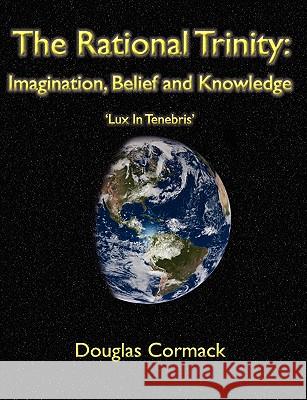The Rational Trinity: Imagination, Belief and Knowledge » książka
The Rational Trinity: Imagination, Belief and Knowledge
ISBN-13: 9780755211968 / Angielski / Miękka / 2010 / 460 str.
This book shows that our Rational Trinity evolved through our precursors to constancy in our species Homo sapiens, and that everything we have done is a consequence of being the group-species we are. Thus, we have an awareness of the unknown and the unknowable which stimulates our imagination to produce beliefs which we validate to knowledge consistent with reality or which otherwise remain beliefs because we cannot yet reality-evaluate them or because they are beyond reality-evaluation in principle. Thus, this book shows that our craftsmanship and self-knowledge have accrued since time immemorial by reality-evaluation of our imaginative beliefs as to the usability of reality and the maintenance of our survival dependent social cohesion, and that this self-knowledge was progressively reflected in the deities of our imaginative belief to the reinforcement of adherence to our behaviour codes in reality. Again, this book shows that the methods of craftsmanship led to the experimentation which defines scientific method which from the seventeenth century onwards enabled beliefs concerning the underlying nature of our reality to be validated to the knowledge which inter alia transformed craftsmanship to technology. However, this book also shows that while differences in belief have been the source of conflict from time immemorial, knowledge has been accepted by religious believers regardless of such differences; that in contrast, secular belief now opposes aspects of our self-knowledge and technology; that scientific knowledge and method are now being corrupted to pseudo-science in support of a secular belief supremacy reminiscent of the religious belief supremacy which destroyed the Roman Empire; and that it is imperative to replace our current belief-based democracy with a knowledge-based alternative before democracy itself is lost to the reality rejection of postmodernist relative belief.
This book shows that our Rational Trinity evolved through our precursors to constancy in our species Homo sapiens, and that everything we have done is a consequence of being the group-species we are. Thus, we have an awareness of the unknown and the unknowable which stimulates our imagination to produce beliefs which we validate to knowledge consistent with reality or which otherwise remain beliefs because we cannot yet reality-evaluate them or because they are beyond reality-evaluation in principle.Thus, this book shows that our craftsmanship and self-knowledge have accrued since time immemorial by reality-evaluation of our imaginative beliefs as to the usability of reality and the maintenance of our survival dependent social cohesion, and that this self-knowledge was progressively reflected in the deities of our imaginative belief to the reinforcement of adherence to our behaviour codes in reality. Again, this book shows that the methods of craftsmanship led to the experimentation which defines scientific method which from the seventeenth century onwards enabled beliefs concerning the underlying nature of our reality to be validated to the knowledge which inter alia transformed craftsmanship to technology.However, this book also shows that while differences in belief have been the source of conflict from time immemorial, knowledge has been accepted by religious believers regardless of such differences; that in contrast, secular belief now opposes aspects of our self-knowledge and technology; that scientific knowledge and method are now being corrupted to pseudo-science in support of a secular belief supremacy reminiscent of the religious belief supremacy which destroyed the Roman Empire; and that it is imperative to replace our current belief-based democracy with a knowledge-based alternative before democracy itself is lost to the reality rejection of postmodernist relative belief.











